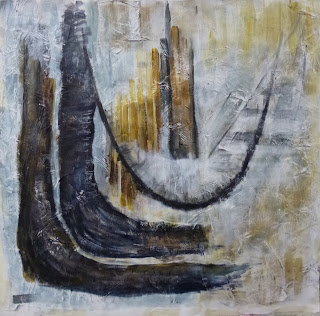Using my time on the train journey to 'Contemporary Painting Studio' at City Lit to prepare my ' to-do' list is proving to be productive ( although my stitching project is feeling neglected) . It's a bit challenging to cut out and glue pictures in an airline style seat although I do find that the seat next to me is left vacant as long as possible...
My lists are always over ambitious but I achieved quite a lot of it in this session: painting over large scale newspaper collage, reviewing potential compositions and exploring large scale marks on pre-painted surfaces
The first job was hanging the newspaper collage from last week back up on the screen easel - much better behaved now it has some substance to it than the initial roll of paper . Then it was a case of loading my palette with a large amount of white acrylic paint and climbing up the step ladder and painting with a large brush - very satisfying. I did one coat before coffee and another afterwards so that after lunch it was dry enough to take off the screen and I could concentrate on my other tasks!
After morning coffee we had a quick review ( 2 mins each) of everyone's work - we did this in the
second session and it was really interesting to see how peoples ideas have developed or changed in the intervening weeks. We were asked to think about approaches used by other people that we found interesting and we might use in our own work.
As I hadn't started on
collage at the previous review, I picked up on different ways this technique was used: working into photocopies with paint to simplify shapes and restrict colour palette; combining photocopies in collages with layers of tissue paper, working into them with paint and drawing (then enlarging and repeating the process).
I also was aware of the importance of format - in a couple of cases we discussed how changing the shape and proportions could alter the impact and focal point of the painting and the difficulties of scaling up from a sketch - do you keep the same format or change it?
Although I'd made the decision not to work in oil paint ( thanks to
Amanda's session on glazing I could achieve a lot of the same effects with acrylics) , there was much to learn from the many accomplished artists there who do use oils , in some cases what wasn't working and why. There were some very interesting layered backgrounds being painted over and scratched into to reveal the underlying paint and a discussion on how to lighten areas with glazes without using white ( can lose translucency ). I remember that lesson from
'starting oil painting' class.
After lunch I looked again at my collages and sketches to review the compositions, to select what might prove interesting developed into a larger piece of work. In
week 5, I'd started to paint into a photo of a collage applied to a painted canvas( above). It was over done and I wasn't happy with how some of it was working so had printed off a black and white and a colour copy to play with.
On the black and white copy I started off by cropping to create a square format then using white thinned acrylic blocked out the areas I didn't like and reinstated the inner dark curve, extended the outer one with dark greys and introduced some breakwaters!
On the colour copy I made similar changes but instead of cropping , I first extended the top part of the image with greyish blue paint to create the square format.
Having rolled up my large newspaper collage for next week, I then used the screen as in previous weeks for taping up sketches/ collages , including mark-making trials and set up an A1 sized newspaper painted collage ( masked off for square format ) on an easel.
My order of large brushes from
Jackson's hadn't yet arrived ( it has now!) but I made do with what was available and had an interesting time applying an initial colour wash and then experimenting with different colour mixes and marks.
I found some of the underlying colour lifted off (note to self: less water more medium need ) and the textured surface provided by the underlying newspaper collage reacted very differently to primed paper( brushmarks were not retained in the same way and the paint was more opaque)
I used up my paint applying drippy colour washes to yet another newspaper collage( where I'd simply pasted a whole sheet down ) from
'Ways into abstract painting'. I'm seeing ghostly hilltop villages and am looking forward to working into it exploring the found shapes.
But I shouldn't get too distracted from my principal task for this weeks class which is getting started on my large scale painting!

























































